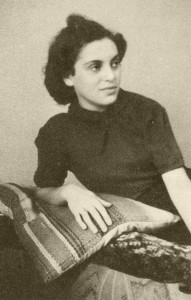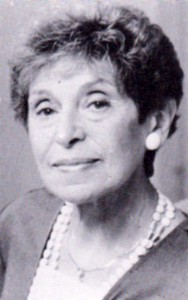
On 28 October 1938 the 17-year-old Esther and her parents, who were born in Warsaw, were deported to Poland along with two of her four siblings. As Esther was just short of her eighteenth birthday and did not yet have her own passport she was separated from her family in Zbaszyn at the Polish border. She watched her family continue on to their uncertain fate after being pulled out of the line of people who had been deported. She was housed in an emptied synagogue with many other people. No one provided them with anything to eat or drink, only the Jews who lived in the city were permitted to receive provisions. After a few days a young Jew came to her and indicated that the gate was open and there was not any guard on duty. She took advantage of this convenient moment and escaped. The helpful Jews in Zbaszyn bought her a train ticket to Frankfurt and she stood at the doorstep of her parents’ former apartment at Hanauer Landstrasse 84 in Frankfurt Ostend before 9 November. A Christian neighbor opened the sealed door for her. It was not a place of refuge but rather a temporary place to stay. Her sympathetic neighbor bought some of her possessions, so she could use this little bit of money to travel to her sister in München. However, she could only stay there a short while, because her sister had a ticket to Shanghai. Esther returned to Frankfurt. Some short overnight stays followed: with her former employer, who lived on the Zeil, with a former teacher from the Philanthropin and finally with her friend Hertha Hahn and the latter’s parents at Telemannstrasse 20. The Hahn family also sat on packed suitcases. Gustav and Recha Hahn had sold their house and property in Frankfurt-Fechenheim and waited for an entry visa for Great Britain. They had even initiated a second exit alternative for their 17-year-old daughter Hertha. She was able to obtain a Domestic Permit, which was tied to a position in a British household after she had completed a cooking and language course. The Hahns arranged that the already approved Domestic Permit be transferred in Esther’s name, because they expected to leave together very soon. To receive a visa for Great Britain with which one could leave Nazi Germany was like winning a lottery prize.
Esther emigrated to London on 17 May 1939. Once there she inquired as to the status of the visa for the Hahn family and was told that it would be sent in the next few days. However, the days turned into weeks and until the start of the war in September 1939 the Hahn family had still not managed to start their journey, which they had organized in time. They were deported to the ghetto in Lodz as part of the first large deportation on 19 October 1941, where they were killed. Esther also never saw her parents, sister Rosa and brother Leo again. She moved to the USA with her husband in 1945.
The loopholes to escape to Great Britain via a transit visa, a Domestic Permit or as part of a children transport closed with the start of the war on 1 September 1939.
